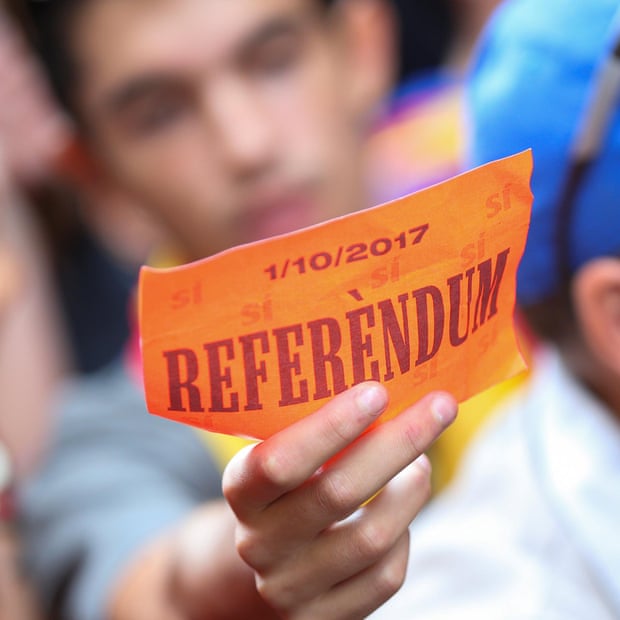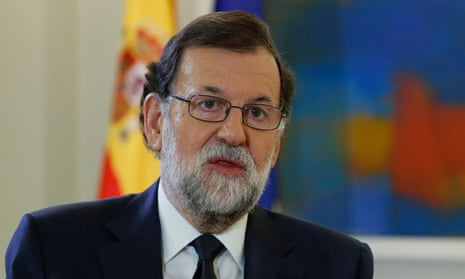The Spanish prime minister, Mariano Rajoy, has asked the Catalan government to clarify whether or not it has declared independence, as he considers the unprecedented step of suspending the region’s autonomy and imposing direct rule from Madrid.
On Tuesday evening, the Catalan president, Carles Puigdemont, said while the referendum this month had given his government a mandate to create a sovereign republic, he would not immediately push ahead with independence from Spain.
Although he signed a declaration of independence, he proposed that its effects be suspended for a few weeks to allow for dialogue.
Rajoy, who has refused to rule out invoking article 155 of the Spanish constitution to take control of Catalonia, was quick to seize on the ambiguity of Puigdemont’s position, accusing him of deliberately sowing confusion.
The prime minister also rejected calls for external mediation between the two governments, insisting the Catalan question remained a domestic matter.
“The cabinet has agreed this morning to formally require the Catalan government to confirm whether it has declared independence after the deliberate confusion created over whether it has come into effect,” he said in a television address on Wednesday.
“This request, which comes before any of the measures that the government could adopt under article 155 of our constitution, is meant to offer our citizens the clarity and security that such an important issue requires.”
Rajoy said Puigdemont had until Monday 16 October to confirm whether or not independence had been declared and then a further three days to rectify the situation and restore “constitutional order”. If he failed to do so, Rajoy said the government would activate article 155.
“The Catalan president’s answer to these questions will inform what happens over the next few days,” he said. “If Mr Puigdemont demonstrates a willingness to respect the law and re-establish institutional normality, we could bring a close to a period of instability, tension and the breakdown of co-existence.
“That is what everyone wants and expects; it’s what they’ve been demanding. We must put an urgent end to the situation in Catalonia. There must be a return to normality and calm as swiftly as possible.”
Speaking later on Wednesday, Pedro Sánchez, the leader of Spain’s Socialist party (PSOE), urged Puigdemont to “be black and white” about whether independence had been declared but offered a possible way out of the crisis.
If independence had been declared, said Sánchez, then the PSOE would back the actions of the Spanish government. But he also said that he and Rajoy had agreed that there should be a commission to examine the possibility of changing the way the country’s autonomous regions are governed through constitutional reform.
The idea, Sánchez added, was to find a formula to “allow for Catalonia to remain a part of Spain”. While talks on the matter will not begin for six months – meaning there is still ample scope to apply article 155 – the move could go some way to showing that negotiations are possible if Puigdemont backs away from independence. It also shows that Rajoy and Sánchez are increasingly united in the face of the secessionist threat.
In an address to parliament on Wednesday afternoon, Rajoy described the referendum as an “illegal and fraudulent” act, dismissed Puigdemont’s independence plans as a “fairytale” and said Spain would resolve the standoff on its own.
He was adamant that there could be no discussion of Spain’s national unity as laid out in the constitution.
“That’s something that the many mediators who have offered themselves over recent days should bear in mind,” he said.
“Most of them have offered to help in good faith to find a way out of this situation. I can only thank them for their concern and their interest. But there is no possible mediation between democratic law and disobedience or illegality.”
He has repeatedly pointed out that the referendum and the laws underpinning it are a violation of the Spanish constitution, which is based “on the indissoluble unity of the Spanish nation, the common and indivisible homeland of all Spaniards”.
Q&AWhy does the Spanish government say the Catalan referendum is illegal?
Show

The Spanish government argues that any referendum on Catalan independence would be illegal because the country’s 1978 constitution makes no provision for a vote on self-determination.
The Spanish constitutional court, which has suspended the referendum law pushed through the Catalan parliament in September, is looking into whether the law breaches the constitution.
In March this year, the former Catalan president Artur Mas was banned from holding public office for two years after being found guilty of disobeying the constitutional court by holding a symbolic independence referendum three years ago.
Barring a sudden climbdown from Puigdemont, Rajoy looks likely to become the first Spanish prime minister to take the drastic step of invoking article 155.
It allows the central government to take control of an autonomous region if it “does not fulfil the obligations imposed upon it by the constitution or other laws, or acts in a way that is seriously prejudicial to the general interest of Spain”.
However, its invocation could provoke civil unrest in Catalonia, where tensions remain high after the Spanish police’s crackdown on the referendum and where thousands of national police and Guardia Civil officers are still deployed.
Puigdemont’s proposal to suspend a declaration of independence to allow for negotiations pulled the region back from the brink of a showdown with Madrid, but it also drew criticism from the leader of the opposition in the Catalan parliament and his pro-independence junior coalition partners.
The Catalan president had originally promised to make a unilateral declaration of independence within 48 hours of a victory for the yes campaign, but has instead chosen to seek international help for mediated negotiations.
He renewed his calls for dialogue on Wednesday, saying it was time to sit down and talk.
“Maybe, it could help [us] to talk if two people representing the Spanish government and two people representing the Catalan government just simply agree on one thing, for instance, naming a mediator,” he told CNN.
“Yesterday I tried to send a message of calmness and to remind people that we are facing a political problem that we need to solve with politics and not with police.”
Puigdemont also claimed that most Catalans were in favour of independence, saying: “The relationship between Catalonia and Spain does not work and the majority of Catalan people want Catalonia as an independent state.”
While 90% of participants in the poll voted in favour of splitting from Spain, only 2.3 million of Catalonia’s 5.3 million registered voters – 43% – took part. However, according to the Catalan government, 770,000 votes were lost after Spanish police stepped in to try to halt the vote.
